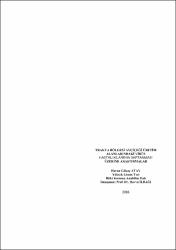| dc.contributor.author | ATAY, Harun Gökay | |
| dc.date.accessioned | 2017-05-23T07:20:02Z | |
| dc.date.available | 2017-05-23T07:20:02Z | |
| dc.date.issued | 2016 | |
| dc.identifier.uri | https://hdl.handle.net/20.500.11776/1164 | |
| dc.description.abstract | Dünya’da olduğu gibi Türkiye’de de tohumları bitkisel yağ kaynağı olarak insan beslenmesinde ve gıda sanayinde ham madde olarak kullanılan ayçiçeği (Heliantus annuus L.) önemli bir yağ bitkisidir. Türkiye’deki ayçiçeği üretiminde Trakya Bölgesi’nin Edirne, Kırklareli ve Tekirdağ illeri önemli bir yere sahiptir. Trakya Bölgesi’nin ayçiçeği üretim alanlarında yağlık tohum verim ve kalitesini olumsuz yönde etkileyen virüs hastalıklarını saptamak amacıyla 2015 yılının iki farklı döneminde sürvey çalışmaları gerçekleştirilmiştir. Sürveyler esnasında toplanan 244 adet simptomatik ayçiçeği ve yabancı ot yaprak örneklerindeki viral hastalıkların varlığı serolojik test yöntemleri ile araştırılmıştır. Enfekteli ayçiçeği ve yabancı ot yaprak örneklerindeki viral hastalık etmenlerinden; Potato virus Y (PVY) Double Antibody Sandwich Enzyme Linked Immunosorbent Assay (DAS-ELISA) test yöntemi, Tobacco streak virus (TSV) Triple Antibody Sadwich-Enzyme Linked Immuno Sorbent Assay (TAS-ELISA) test yöntemi ile Potyvirus’ler ise Plate Trapped Antibody- Enzyme Linked Immuno Sorbent Assay (PTA-ELISA) test yöntemi ile araştırılmıştır. Ayrıca virüsle enfekteli ve sağlıklı ayçiçeği bitkilerinden hasat edilen tohumlarda bin dane ağırlığı, hektolitre ağırlığı ve yağ içerik oranları da mukayese edilerek virüs hastalıklarının ayçiçeğindeki kalite kriterlerine olan etkileri araştırılmıştır. Serolojik testlerden, DAS-ELISA test sonuçlarına göre Trakya Bölgesi’ndeki ayçiçeği tarlalarında PVY’nin bulunmadığı saptanmıştır. TAS-ELISA test sonuçlarına göre ise 244 adet bitki örneğinin 11 adedinde % 4,51 oranında TSV ile enfekteli olduğu tespit edilmiştir. PTA-ELISA test sonuçlarına göre de 244 adet bitki örneğinden 25 adedinde % 10,25 oranında Potyvirus’lerin bulunduğu saptanmıştır. Böylece toplam olarak 244 adet bitki yaprak örneğinin 36 adedinde % 14,75 oranında virüslerin ayçiçeği üretim alanlarında bulunduğu kanıtlanmıştır. Elde edilen bu bulgular, Türkiye’de ayçiçeğinde virüs hastalıklarının bulunuşunu gösteren ve kanıtlayan ilk rapor niteliğindedir. Virüs hastalıklarının etkisinin ayçiçeği yağlı tohumlarındaki verim unsurlarına etki eden kalite kriterlerine bakıldığında hastalığın bin dane ağırlığı ve hektolitre ağırlıklarını düşürdüğü yağ içeriğini ise nisbeten yükselttiği kanısına varılmıştır. | en_US |
| dc.description.abstract | Being an important source of vegetable oil for human consumption and the source of raw material for food industry, sunflower ( Helianthus annuus L.) production has been increased steadily in the World and as well as in Turkey. Edirne, Kırklareli and Tekirdağ provinces in the Trakya region have been important sunflower growing areas in Turkey. In order to determine virus diseases reducing oil seed yield and quality survey studies were conducted in two different periods during 2015 growing season. In order to determine viruses on symptomatic sunflowers and weed hosts, 244 leaf samples were collected. For the identification of Potato virus Y (PVY), Double Antibody Sandwich Enzyme Linked Immunosorbent Assay (DAS-ELISA) test, for Tobacco streak virus (TSV) Triple Antibody Sandwich-Enzyme Linked Immuno Sorbent Assay (TAS-ELISA) and for the identification of Potyvirus’es Plate Trapped Antibody-Enzyme Linked Immuno Sorbent Assay (PTA-ELISA) test methods were employed. For the determination of the effect of virus infections on sunflower seed yield criteria, seeds were harvested from both infected and healthy plants separately which compared for their 1000 seed weight, hectoliter seed weight and their oil content. According to DAS-ELISA test results PVY never present in the sunflower fields of Trakya Region. Depending on symptomatic observations and the results of TAS-ELISA tests 11 out of 244 plant samples had TSV with the rate of 4.51 %. As the results of PTA-ELISA tests and the symptomatic field observations 25 of 244 plants were found infected with Potyvirus’es with the rate of 10.25 %. Totally 36 out of 244 plant samples revealed the presence of viruses with the rate of 14.75 % in the sunflower growing areas. This is the first report of the presence of virus infections on sunflowers in Turkey. Virus infections cause reductions of 1000 seed and hectoliter seed weights of oil seeds as the oil content was found slightly high. | en_US |
| dc.language.iso | tur | en_US |
| dc.publisher | Namık Kemal Üniversitesi | en_US |
| dc.rights | info:eu-repo/semantics/openAccess | en_US |
| dc.subject | Ayçiçeği | en_US |
| dc.subject | Heliantus annuus L. | en_US |
| dc.subject | ELISA | en_US |
| dc.subject | PVY | en_US |
| dc.subject | TSV | en_US |
| dc.subject | Potyvirus | en_US |
| dc.subject | Sunflower | en_US |
| dc.title | Trakya bölgesi ayçiçeği üretim alanlarındaki virüs hastalıklarının saptanması üzerine araştırmalar | en_US |
| dc.title.alternative | Investigations and the description of virus diseases in sunflower growing areas in the trakya region of Turkey | en_US |
| dc.type | masterThesis | en_US |
| dc.department | Enstitüler, Fen Bilimleri Enstitüsü, Bitki Koruma Ana Bilim Dalı | en_US |
| dc.relation.publicationcategory | Tez | en_US |



















